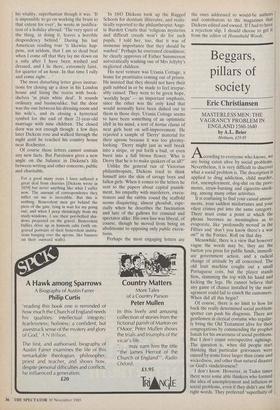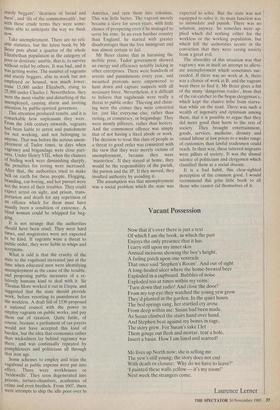Beggars, pillars of society
Eric Christiansen
MASTERLESS MEN: THE VAGRANCY PROBLEM IN ENGLAND 1560-1640 by A.L. Beier
Methuen, £19.95
According to everyone who knows, we are being eaten alive by social problems. Nevertheless, it is very difficult to discover what a social problem is. The description Is applied to drug addiction, child murder, riot, unemployment, dog-shit on the pave- ments, straw-burning and cigarette-smok- ing, among many other activities.
It is confusing to find your casual amuse- ments, your saddest misfortunes and your vilest crimes put into the same category. There must come a point at which the phrase becomes so meaningless as to evaporate, like 'profoundly moved' in the Fifties and 'don't you know there's a war on?' in the Forties. Roll on that day.
Meanwhile, there is a view that however vague the words may be, they are the button you press for public funds, immedi- ate government action, and a radical change of attitude by all concerned. The old fruit machine coughs out a small Portuguese coin, but the player stands firm, slamming the top with his hand and kicking the legs. He cannot believe that any game of chance installed by the man- agement could fail to enrich the customers. When did all this begin?
Of course, there is no limit to how far back the really determined social problem- spotter can push his diagnosis. There are gentlemen in clerical costume who regular- ly bring the Old Testament alive for their congregations by commending the prophet Isaiah for his awareness of social problems. But I don't count retrospective sightings. The question is, when did people start thinking that particular grievances were caused by some force larger than crime and wickedness, and other than natural disaster or God's vindictiveness?
I don't know. However, in Tudor times there were some able thinkers who formed the idea of unemployment and inflation as social problems, even if they didn't use the right words. They preferred 'superfluity of sturdy beggars', 'dearness of bread and meat', and 'ills of the commonwealth', but With these crude terms they were some- times able to anticipate the way we think now.
Take unemployment. There are no reli- able statistics, but the latest book by Mr Beier puts about a quarter of the whole Elizabethan population in the category of poor or destitute: unable, that is, to survive Without relief by others. It was bad, and it was getting worse. The number of vagrants and sturdy beggars, able to work but not employed or housed, was much lower: some 15,000 under Elizabeth, rising to 25,000 under Charles I. Nevertheless, they were the most visable and disturbing of the unemployed, causing alarm and inviting attention by public-spirited governors. This attention produced results, and it is remarkable how unpleasant they were. From the 14th century onwards, vagrants had been liable to arrest and punishment for not working, and not belonging to anyone. That was before the serious unem- Ployment of Tudor times, in days when vagrancy and brigandage were close part- ners. Under Henry VIII, when the chances of finding work were diminishing sharply, the penalties for roving were increased. After that, the authorities tried to make hell on earth for these people. Flogging, branding, ear-boring, and hot pursuit were not the worst of their troubles. They could expect arrest on sight, and prison, trans- Portation and death for any repetition of an offence which for them must have usually been a condition of existence. A blind woman could be whipped for beg- ging.
It is not strange that the authorities should have been cruel. They were hard times, and magistrates were not expected to be kind. If vagrants were a threat to public order, they were liable to whips and scorpions.
What is odd is that the cruelty of the state to the vagabond increased just at the time when educated men were identifying unemployment as the cause of the trouble, and proposing public measures of a re- latively humane kind to deal with it. Sir Thomas More worked it out in Utopia, and suggested that the state should provide work, before resorting to punishment for the workless. A draft bill of 1536 proposed a national council with the power to employ vagrants on public works, and pay them out of taxation. Quite futile, of course, because a parliament of tax-payers would not have accepted this kind of burden, but the idea that economics rather than wickedness lay behind vagrancy was there, and was continually repeated by Pamphleteers and politicians all through that iron age.
Some schemes to employ and train the vagabond at public expense were put into effect. There were workhouses or 'bridewells'. They soon degenerated into prisons, torture-chambers, academies of crime and even brothels. From 1607, there were attempts to ship the idle poor over to America, and turn them into colonists. This was little better. The vagrant merely became a slave for seven years, with little chance of prospering even if he managed to serve his time. In an even harsher country than England, he started with greater disadvantages than the free immigrant and was almost certain to fail.
Mr Beier claims that in harassing the mobile poor, Tudor government showed an energy and efficiency notably lacking in other enterprises. There were hundreds of arrests and punishments every year, and mounted provosts were empowered to hunt down and capture suspects with all necessary force. Nevertheless, it is difficult to believe that vagabonds were really a threat to public order. Thieving and cheat- ing were the crimes they were convicted for, just like everyone else, rather than rioting, or conspiracy, or brigandage. They were mostly pilferers, rather than looters. And the commonest offence was simply that of not having a fixed abode or work. The decision to treat this class of people as a threat to good order was consistent with the view that they were merely victims of unemployment, because they were 'masterless'. If they stayed at home, they would be the responsibility of the parish, the parson and the JP. If they moved, they insulted authority by avoiding it. The assumption was that unemployment was a social problem which the state was expected to solve. But the state was not equipped to solve it; its main function was to intimidate and punish. There was no solution, anyway. So remedies were ap- plied which did nothing either for the workless or the working population, but which left the authorities secure in the conviction that they were saving society from a great evil.
The absurdity of this situation was that vagrancy was in itself an attempt to allevi- ate unemployment which sometimes suc- ceeded. If there was no work at A, there was a chance of work at B, and the vagrant went there to find it. Mr Beier gives a list of the many 'dangerous trades', from that of the rat-catcher to the bogus clergyman's, which kept the elusive tribe from starva- tion while on the road. There was such a wealth of ingenuity and optimism among them, that it is possible to argue that they did more good than harm to the rest of society. They brought entertainment, goods, services, medicine, divinity and casual labour at low prices to a wider range of customers than lawful tradesmen could reach. In their way, these tattered migrants were pillars of society. It was the dismal science of politicians and clergymen which classified them as a social disease.
It is a had habit, this clear-sighted perception of the common good. I would recommend this grim little book to all those who cannot rid themselves of it.



























































 Previous page
Previous page